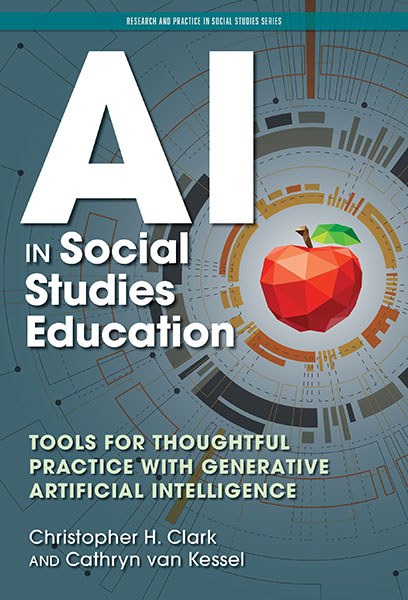Professors: Request an Exam Copy
Print copies available for US orders only. For orders outside the US, see our international distributors.
Edited by: Christopher H. Clark, Cathryn van Kessel
Foreword by: Kent den Heyer
Publication Date: March 28, 2025
Pages: 224
Series: Research and Practice in Social Studies Series

Whether skeptical or enthusiastic about AI, every social studies educator will find something useful for their practice in this book.
The introduction of widely available generative AI tools has caused a frenzy of both positive and negative reactions. Between utopian visions and apocalyptic predictions of AI’s impact on education, there is a need to thoughtfully consider what education in the age of AI can and should look like.
This volume focuses on the implications of AI technology for teachers in K–12 and university settings, providing a careful look at its affordances and drawbacks for social studies curriculum and teaching. Scholars specializing in the field of social studies education provide information and practical ideas for teaching with current technology, alongside frameworks for thinking about future iterations of AI.
This book fills a critical need, especially among educators, to consider the current and potential future impacts of AI while avoiding the traps of alarmism or techno-utopianism.
Book Features:
Christopher H. Clark is an associate professor in the Department of Teaching, Leadership, and Professional Practice at the University of North Dakota. Cathryn van Kessel is an associate professor of curriculum studies in the Department of Counseling, Societal Change, and Inquiry in the College of Education at Texas Christian University.
“This book invites us to consider when we might use or refuse AIs, and collectively asks us to think about how AIs fit (or do not) into our preferred futures, with some chapters examining specific uses while others take up broader concerns. . . . As readers will be, I am thankful this collection’s editors and authors articulate so well AI's multiple dimensions and the promises and perils AIs bring to our social studies classroom and beyond.”
—From the Foreword by Kent den Heyer, professor, University of Alberta
“Proceed with caution, curiosity, and a critical eye. That is the message from the authors in this timely volume on the affordances and constraints of using artificial intelligence tools in teaching and learning social studies. Given the rapidly advancing generative and interactive AI platforms, these chapters can serve as a starting point for thoughtfully teaching with and about AI now and in the future.”
—Jeremy D. Stoddard, professor, University of Wisconsin–Madison
Contents
Foreword: Forty-Two: Questability and AIs Kent den Heyer vii
Acknowledgments xiii
Introduction Christopher H. Clark and Cathryn van Kessel 1
1. A Technoskeptical Approach to Generative AI in Social Studies Education 12
Daniel G. Krutka and Marie K. Heath
2. What Do We Educators Want to (Re/De/Mis)Generate With AI? 29
Tim Monreal, Vi Trinh, Tina Soliday, Dawnavyn James, Patrick Kane, Matthew Cress, and Daphanie Bibbs
3. Unpacking the AI Hype: Essential Understandings and Recommendations for Social Studies Education 42
Rachel Moylan and Lindsay Gibson
4. Integrity, Confidentiality, and Equity: Creating Secure and Trustworthy AI-Driven Tools for the Common Good 61
Curby Alexander and Liran Ma
5. Critically Collaborating With Artificial Intelligence (AI) to Enhance Social Studies Educators’ Instructional Practices 77
Michelle Reidel, Ariel Cornett, and Elizabeth Barrow
6. Integrating AI Literacy Within Social Studies: An Argument, a Framework, and a Call to Action 99
Thomas C. Hammond, Zilong Pan, and Julie Oltman
7. In AI We Trust? 119
Christopher H. Clark and Elizabeth Reynolds
8. Preparing Social Studies Teachers to Apply ChatGPT as a Linguistically Responsive Tool for Multilingual Learners Through Teacher Research 136
Kevin Donley
9. Using or Eschewing AI for Mixed-Media Art Journaling in History Education 152
Leslie Smith Duss
10. (Posthuman) ABCs of Artificial Alternative Intelligence(s) and Implications for Social Studies Education 165
Erin C. Adams and Bretton A. Varga
Concluding Thoughts 184
Christopher H. Clark and Cathryn van Kessel
Endnotes 191
Index 193
About the Editors and Contributors 205
Professors: Request an Exam Copy
Print copies available for US orders only. For orders outside the US, see our international distributors.